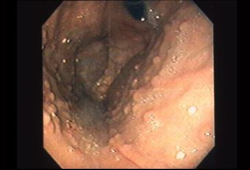Resumo
Definição
Anamnesis y examen
Principales factores de diagnóstico
- family history of FAP/attenuated FAP
- teenager
- onset of colorectal cancer in middle age
- bilateral pigmentation of the retina
Otros factores de diagnóstico
- constipation/diarrhea
- hematochezia
- extraintestinal features of familial adenomatous polyposis (FAP)
Factores de riesgo
- germline adenomatous polyposis coli (APC) gene mutation
- family history of familial adenomatous polyposis (FAP) or attenuated FAP
Pruebas diagnósticas
Primeras pruebas diagnósticas para solicitar
- genetic testing
Algoritmo de tratamiento
FAP: without colonic adenomas
FAP: with colonic adenomas
attenuated FAP: without colonic adenomas
attenuated FAP: with colonic adenomas
Colaboradores
Autores
Priyanka Kanth, MD, MS, FACG, AGAF
Associate Professor of Medicine
Division of Gastroenterology
MedStar Georgetown University Hospital
Lombardi Comprehensive Cancer Center
Washington
DC
Divulgaciones
PK declares that she has no competing interests.
Agradecimientos
Dr Priyanka Kanth would like to gratefully acknowledge Dr Charles A. Ternent, Dr Alan G. Thorson, Dr Lisa A. Boardman, and Dr Douglas L. Riegert-Johnson, the previous contributors to this topic.
Divulgaciones
CAT, AGT, LAB, and DLRJ declare that they have no competing interests.
Revisores por pares
Galen Leung, MD
Assistant Professor of Clinical Medicine
Perelman School of Medicine
University of Pennsylvania
Philadelphia
PA
Divulgaciones
GL declares that he has no competing interests.
Jatin Roper, MD
Assistant Professor of Medicine
Duke University School of Medicine
Duke University
Durham
NC
Divulgaciones
JR declares that he is a consultant for Microbial Machines.
Yann Parc, MD, PhD
Professor of General Surgery
Department of Digestive Surgery
Hopital Saint-Antoine
Universite Pierre et Marie Curie Paris VI
Paris
France
გაფრთხილება:
YP declares that he has no competing interests.
Gabriela Moslein, MD
Editorial Board
Allgemein- und Viszeralchirurgie
St Josefs-Hospital Bochum-Linden
Dusseldorf
Germany
გაფრთხილება:
GM declares that she has no competing interests.
რეცენზენტების განცხადებები
BMJ Best Practice-ის თემების განახლება სხვადასხვა პერიოდულობით ხდება მტკიცებულებებისა და რეკომენდაციების განვითარების შესაბამისად. ქვემოთ ჩამოთვლილმა რეცენზენტებმა თემის არსებობის მანძილზე კონტენტს ერთხელ მაინც გადახედეს.
გაფრთხილება
რეცენზენტების აფილიაციები და გაფრთხილებები მოცემულია გადახედვის მომენტისთვის.
წყაროები
ძირითადი სტატიები
National Comprehensive Cancer Network. NCCN clinical practice guidelines in oncology: genetic/familial high-risk assessment: colorectal, endometrial, and gastric [internet publication].სრული ტექსტი
Yang J, Gurudu SR, Koptiuch C, et al. American Society for Gastrointestinal Endoscopy guideline on the role of endoscopy in familial adenomatous polyposis syndromes. Gastrointest Endosc. 2020 May;91(5):963-82.e2.სრული ტექსტი აბსტრაქტი
Hyer W, Cohen S, Attard T, et al. Management of familial adenomatous polyposis in children and adolescents: Position paper from the ESPGHAN polyposis working group. J Pediatr Gastroenterol Nutr. 2019 Mar;68(3):428-41.სრული ტექსტი აბსტრაქტი
Poylin VY, Shaffer VO, Felder SI, et al. The American Society of Colon and Rectal Surgeons Clinical Practice Guidelines for the management of inherited adenomatous polyposis syndromes. Dis Colon Rectum. 2024 Feb 1;67(2):213-27.სრული ტექსტი აბსტრაქტი
Zaffaroni G, Mannucci A, Koskenvuo L, et al. Updated European guidelines for clinical management of familial adenomatous polyposis (FAP), MUTYH-associated polyposis (MAP), gastric adenocarcinoma, proximal polyposis of the stomach (GAPPS) and other rare adenomatous polyposis syndromes: a joint EHTG-ESCP revision. Br J Surg. 2024 May 3;111(5):znae070.სრული ტექსტი აბსტრაქტი
გამოყენებული სტატიები
ამ თემაში მოხსენიებული წყაროების სრული სია ხელმისაწვდომია მომხმარებლებისთვის, რომლებსაც აქვთ წვდომა BMJ Best Practice-ის ყველა ნაწილზე.

დიფერენციული დიაგნოზები
- MUTYH polyposis
- Juvenile polyposis
- Peutz-Jeghers syndrome
მეტი დიფერენციული დიაგნოზებიGuías de práctica clínica
- NCCN clinical practice guidelines in oncology: genetic/familial high-risk assessment: colorectal, endometrial, and gastric
- Clinical practice update on nonampullary duodenal lesions: expert review
მეტი Guías de práctica clínicaFolletos para el paciente
Colon and rectal cancer: what is it?
Colon and rectal cancer: what are the treatment options?
Más Folletos para el pacienteInicie sesión o suscríbase para acceder a todo el BMJ Best Practice
El uso de este contenido está sujeto a nuestra cláusula de exención de responsabilidad